- Home
- Lauren Oliver
The Fearsome Firebird Page 18
The Fearsome Firebird Read online
Page 18
“See?” Pippa turned to Max, smiling. “That was easy, wasn’t it?”
“You know what I think, Pippa?” Max slung an arm around Pippa’s shoulders. Despite the seriousness of what they had come to do, in that moment, with the silhouette of Manhattan etched against the starry sky, and the waves lapping quietly on the shore, and her three best friends standing beside her, she felt a sense of joy and well-being. “We’re going to make a criminal of you yet.”
“I suppose, coming from you, that’s supposed to be a compliment,” Pippa said. But she didn’t turn away fast enough to conceal the fact that she was smiling.
Max’s happiness was snuffed out as quickly as it had come, replaced by a creeping sense of anxiety. The streets of Staten Island were still, silent, and dark. Max had the uncomfortable feeling of trespassing in an abandoned house. Even the area around Borough Hall, bustling with activity during the day, looked ominous in the dark, everything shuttered and locked, and a lone dog barking somewhere in the distance.
They found Bay Street easily. As the name suggested, the street ran parallel to the water and took them away from the municipal district and into an area of looming industrial buildings, boat repair shops, truck lots, and canneries.
Soon the pavement petered out and was replaced by loose gravel and then, finally, by hard-packed dirt, rutted with deep tire marks and wagon wheels. The trees grew thicker on either side of them, tall pines that crowded out the moonlight, and owls hooted from the branches.
Fear tightened in Max’s stomach. She was never afraid in any other section of New York, even in the worst, the dingiest, most dangerous areas. She was at home among the clamor and the filth, the guttersnipes and the street urchins, the hobos and the hustlers. It was here, in this wide-open space, with nothing but the sound of wind through the trees and the crunch of their feet on the road, that she felt truly afraid.
Finally, she couldn’t take it anymore. “Are you sure this is the right way?” she blurted, hoping her voice wouldn’t squeak.
At that instant, Thomas stopped, sucking in a quick breath. “I’m sure,” he said, and pointed.
Just down the road was a break in the trees and a tall chain-link fence that ran parallel to the road. Beyond, the dark silhouette of a group of buildings was just visible, and a large sign, barely illumined by the moonlight, read: WOODHULL ENTERPRISES. PRIVATE. NO TRESPASSING.
They advanced more quietly now, sticking close to the shadows, expecting guards to be patrolling. The chain-link fence was at least eighteen feet high and topped by thick strands of spiked barbed wire. The single metal gate, which when opened would have been broad enough to admit two trucks side by side, was locked from the inside. Beyond the fence was an expanse of bare dirt the size of four football fields laid end to end, a small brick building, and a vast airplane hangar that gleamed a pale pearl-white.
“That’s where Rattigan must be housing the dirigible,” Thomas said, indicating the hangar.
“Okay.” Max eyed the fence in frustration. “But how do we get in?”
“I’ll do it,” Sam said, stepping forward to rip a hole in the fence.
“No,” Thomas said, laying a hand on his arm. “If anyone’s patrolling, they’ll see that someone’s inside who doesn’t belong. We can’t risk an alarm. I’ll do it.” Before anyone could stop him, he sprang onto the fence and began climbing, moving soundlessly, like a spider up a wall.
“Thomas, no,” Pippa whispered. She turned to the others, wide-eyed. “He’ll get hurt.”
Max moved to the fence and grabbed hold of it, trying to shake Thomas off. But the fence was thick and sturdy, and Thomas was already nearly at the top of it. He hesitated, scanning the complex arrangement of barbed wire, searching for a way around it. It looked, to Max, impossible: like a thorny metal hedge sprouting from the top of the fence.
But all at once, Thomas flipped. Max’s breath caught in her throat. Pippa gasped. Thomas kicked his legs upward, above his head, so for a second he was balancing in a perfect handstand.
Then he arched his back and his body formed a U-curve as he carefully bridged the first curl of barbed wire. Releasing his grip, he shinnied carefully under the second. Almost immediately, he swept sideways, under a third curl of wire, and somersaulted down onto the opposite side of the fence, so that he was temporarily frozen there, catlike, sweat glistening on his forehead. Then he clambered down the fence and reached the ground safely.
“You did it!” Max burst out, and Pippa hushed her sharply.
Sam, Max, and Pippa hurried to the gate while Thomas worked the lock open from the inside. A moment later, they were all slipping into the Woodhull Enterprises compound. Still, no one had appeared. Everything was perfectly silent. But Thomas replaced the lock on the gate, just in case.
They started across the yard toward the airplane hangar, bent nearly double and trying to stick to the shadows just in case some unseen guards were watching. Max’s instincts were going crazy, firing off warning signals, blazing sirens in her head. Where was everybody? What if the dirigible wasn’t even here?
But as they circled the vast hangar they at last heard voices and the muffled sound of heavy equipment being moved. Half a dozen trucks were parked in front of the loading dock. The doors were open to reveal the dirigible, bullet-shaped and enormous, gleaming in the murk. Thomas gestured for them to hang back, ducking underneath a truck bed and concealing himself in the wheel well. Max flattened herself against one of the truck’s enormous tires next to the others, trying to calm her frantically beating heart, inhaling the smell of rubber and, beneath that, soft ground. When she was no longer shaking, she risked a glance toward the loading dock.
From one of the trucks, workers in gas masks were unloading crate after crate and disappearing with them into the hangar. As one of the men passed beneath a circle of light, Max saw a skull and crossbones emblazoned on the load he was carrying and the words Danger! Hazard! painted in huge black letters beneath that. In their masks, the men looked like enormous insects.
“Are you okay?” Sam whispered to her.
She wanted to say something clever and confident, so he would know she wasn’t afraid, but in the end she only nodded.
“There it is.” Thomas was nearly invisible, concealed as he was in the dark. “What do you want to bet that’s all the gas?”
“What are we going to do?” Pippa whispered.
“We have to get onto that dirigible,” Thomas said. “We have to make sure it never gets airborne.”
“Now’s our chance,” Sam said. “Look—the coast’s clear.”
Sam was right: the workers had all vanished, and the night had once again gone still. Wrong, Max’s inner alarm was still shrieking. Wrong, wrong. It was all this silence: so much of it she felt like she was going to be swallowed.
“Follow me,” Thomas said. Before Max could protest, he was on his feet, and Pippa was hurrying after him, staying low to the ground, and Sam slid out from underneath the truck bed. Max tried to stand and found that although she could hear her brain screaming the command at her legs, her legs had decided to ignore her. She would be left alone—she wouldn’t be able to move, and the others would leave her here, huddled in a shadow, just waiting for Rattigan to find her.
“You’re sure you’re okay?”
Max looked up. Sam was still next to her, ducking low to meet her eyes. He hadn’t abandoned her after all. All of her confidence came rushing back at once. She reached out, seized the hand he offered her, and wiggled free of the underside of the truck. She checked to make sure that her knives were in her pockets. They were.
“Ask me again,” she whispered back, “and you’ll be picking your teeth with a pocketknife.”
“There’s the Max I know,” he said, and even managed to smile.
“Pssst.” Pippa and Thomas had already crossed to the loading dock, carefully avoiding the light cast by the giant flood lamp on the roof. Pippa waved them forward and they hurried across the yard, Max’s hear
t going like a fist trying to punch through a wall. But she wasn’t afraid, not like before. She was focused.
She was angry.
The hangar was cool, dark, and smelled like dust. Max had the feeling of passing into an ancient tomb, as if the dirigible were a prehistoric creature that had been sealed up forever in darkness, turning white from lack of sun. The dirigible itself was larger, and more strangely beautiful, than she could have ever imagined, like a building turned on its side. For a moment, though they should have been hurrying, Pippa, Sam, Max, and Thomas were all struck dumb with wonder.
There was one problem with the dirigible’s design: Max saw no obvious way of getting onto it.
Sam had obviously realized the same thing. “So how, exactly, are we supposed to keep it from taking off?”
“Oh, I don’t think you’ll want to do that. You’d miss out on the show.”
The voice behind them made Max’s whole body go to ice, as if she’d been thrown headfirst into a snowbank. They whirled around.
Rattigan. Silhouetted in the light, his face was a dark mask, completely unreadable. But Max knew he was smiling.
“Hello, my children,” he said with a happy sigh. “You’re late.”
“You know what I love most about New York City?” Rattigan sighed as a view of the Upper Bay, glittering in the morning light, unfolded beneath the airship’s windows. “How enormous it is. All of that energy. All of those people! Millions of people. And yet from here, it might as well be a toy city. Like something that might be crushed with a simple footstep.”
His voice was light, teasing, but Thomas’s stomach coiled up in a knot. He knew what Rattigan was implying: the streets of New York City would be filled by now with all the people who’d come to watch the dirigible float over the skyline of Manhattan. And yet in a single instant, Rattigan could wipe out every one of them.
“You won’t get away with this,” Thomas said, wishing he sounded more confident. He, Pippa, Sam, and Max were huddled together across from Rattigan and two of his henchmen. One of them, a reedy man with a straggly mustache, named Clyde Straw, Thomas recognized as the same guy who’d shoved a gun against his neck during the holdup at the bank. The other man, Mickey McClure, had been previously known to the children as Sir Barrensworth. He’d dropped his fake accent and let his real voice—gruff, Brooklyn-inflected—come through.
Both men had very large guns pointed precisely in their direction.
“Oh, I already am,” Rattigan said airily, with a wave of his hand. “In less than fifteen minutes, we’ll reach Manhattan. Thank goodness for all the windows. The view is bound to be spectacular.” His mouth twisted into a cruel smile.
“What’s the point?” Pippa said, struggling against her bindings. She and Max had had their hands bound in front of them by Clyde Straw, just before they’d been marched onto the airship. Thomas and Sam had been left free—“there’s no point with these two,” Rattigan had said, smiling pleasantly, “but I think both will have a hard time finding their way around a bullet”—and instead, for the hours they’d sat on the dirigible while the final preparations were made and the sun crept higher in the sky, they’d been watched by a constant procession of armed guards to make sure they had no possibility of escape.
“You’re going to gas all those innocent people for nothing,” Pippa continued. “You’ll be shot out of the sky. Even if you’re not killed, everyone in the world will go on the hunt for you.”
“I don’t think so,” Rattigan said, settling back in his seat—a chair made of soft leather, like something that belonged in a cushy office. “Have you ever played chess, my dear?”
Pippa narrowed her eyes. “Of course I have,” she said. “What’s that got to do with anything?”
“Chess has everything to do with it,” he said. “In chess, as in life, you have to take out a few pawns before the kings and queens will come into the game.” He folded his pale hands, which had always reminded Thomas of things that were dead and fished out of the water, across his stomach. “You see, my dear, I realized I’d been going about everything the wrong way. For example, I’d been hoping that you would see that your proper place is with me. I’d been, perhaps, counting on it. But then I remembered that the people who get in this world are the people who take. So I changed tactics. I decided simply to take you. And here you are.”
“You didn’t take us,” Max said. “We came looking for you, remember?”
“As I knew you would,” Rattigan said smoothly. “How could you miss the opportunity to play the hero? I’m the only true family you have. How could you miss the chance to prove that you belong, that you matter, that you aren’t the monsters everyone surely thinks that you are? How could you fail to rush out to save all of those poor, innocent people, all of those boys and girls, fathers and mothers, whose lives will end today? You see,” he said, spreading his hands, “I understand you. I’m the only one who truly understands. Haven’t you ever wondered why I chose you to be my soldiers?”
“You chose us because you’re crazy,” Max spat. “There was no reason for it at all. Mr. Dumfrey told us so.”
“And you believed him, I suppose?” For a second, Rattigan’s face transformed: all of his twisted hatred for his half brother was revealed. “I don’t blame him for lying. If you knew the whole truth, you might not be so fond of your dear old Mr. Dumfrey after all.”
“Liar,” Thomas said. He felt a black hatred so thick and deep he thought he might suffocate in it. This was Rattigan’s effect, his ultimate power. It wasn’t only that he was evil. It was that he made you forget that anything in the world was good.
Rattigan’s lips curled back to reveal his long gray teeth. “You poor, strange, broken creatures—unloved and unwanted. Unnatural. You deny the truth even when the truth is undeniable. You deny me—the man who made you, who knows you better than you know yourselves. I do,” he said, cutting Thomas off before he could object. “I see what you will do before you do it—before you even think it. I know what you dream, and think, and wish, and fear.” Rattigan shook his head. “That’s another thing about chess, Pippa. To win, you must always be four steps ahead. To be honest, Thomas”—Rattigan turned to Thomas—“I would have expected you to know this. I would have expected more.”
Rattigan’s eyes were strangely inhuman, flat and at the same time calculating, like the eyes of a snake. But Thomas refused to look away.
“Tell us,” he said, knowing that Rattigan would never miss the opportunity to boast. Thomas had to delay Rattigan long enough to figure a way out of this mess—to figure out how to turn the airship around or crash it or do something. “Tell us how you stayed so far ahead of us.”
“You flatter me,” Rattigan said, but he looked pleased. “Most of it, you know. After our last little encounter, I realized I needed a new approach. All of the hiding and lurking, sneaking through the sewers like a common rat . . .” He shivered. Thomas and Pippa exchanged a look. So that explained how Rattigan had managed to escape the old trolley factory. He’d followed a path down into the sewers through the hidden trapdoor in the floor. “But don’t worry, I don’t hold that against you,” he added, as though they’d asked for his forgiveness. “You helped me, you see. You inspired me to attempt more—a single act of greatness, an act of power, that would make the knights and rooks, the kings and crooks, bow to my command.”
“Robbing banks?” Max said sarcastically. “That was your big act of greatness?”
“That was a regrettable but necessary part of the plan,” Rattigan snapped, looking, for the first time, irritated. Thomas shot Max a warning glance. “Airships don’t come cheap, my dear. Neither, unfortunately, do the ingredients to manufacture two tons of reaper gas. Luckily, I had an old friend to help me out on that front.” He indicated Clyde Straw, who smiled his weasely smile.
Sweat beaded on Thomas’s upper lip. Manhattan was fast approaching. Through the dirigible windows, he could see the tall buildings rising closer. The network of streets w
as starting to take shape, and he could even see the glint of cars and buses in the streets and small dark spots that must be all the people gathered to watch the dirigible’s approach. Among them, Thomas knew, were Chubby and Andrea von Stikk. He pictured all of them with their hands up to their eyes, squinting against the sun, smiling excitedly, totally unaware of the danger that was even now bearing down on them. . . .
They were running out of time.
“But then Erskine started asking questions,” Thomas said, fishing desperately for a way to keep Rattigan talking.
Rattigan frowned. “And Mallett,” he said. “Both of those idiots had to go. Erskine was becoming just a little too curious. He couldn’t understand why Mallett couldn’t get his hands on any more of his precious chemicals. I couldn’t risk that my chef d’oeuvre would be revealed too early. I have spies all over the city, you see,” Rattigan said, casting an amused glance at the man the children had known as Sir Barrensworth. “I have spies parroting back every word you say, every single move you make.”
Thomas felt as if he’d just swallowed one of Max’s knives. His whole body shook with a violent understanding. They were almost directly over Battery Park. Now, through the windows, Thomas could definitely make out people, little individual splotches of color crowding the streets and waving from balconies and rooftops.
Rattigan stood up. “Here we are. After today, everything will be different. The whole country will bow to my demands. The president and the army will answer to me. New York is just the first step. There are other cities. There is more gas. More and more people will die.” He shrugged, as if he were talking about cleaning mold out of a bathtub.
Thomas finally understood. Rattigan was going to use the dirigible to blackmail the government into giving him whatever he wanted: money, freedom, even an army, so that Rattigan could perform his sick experiments, so he could manufacture soldiers, so he could make the perfect world he envisioned, with Rattigan the creator and commander. The plan was disgustingly simple, and Thomas didn’t doubt it would be successful. And even if it wasn’t, how many hundreds of thousands of people would die?

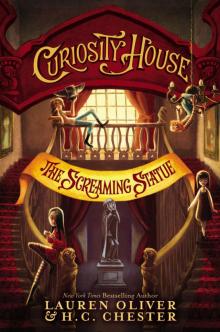 The Screaming Statue
The Screaming Statue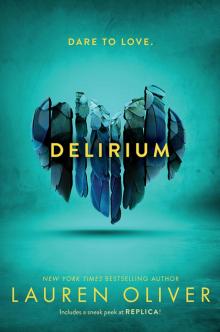 Delirium
Delirium Before I Fall
Before I Fall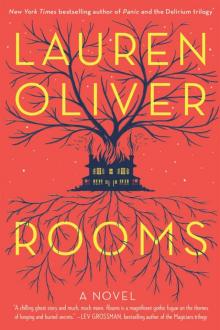 Rooms
Rooms Replica
Replica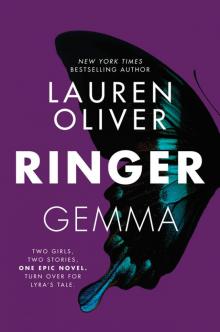 Ringer
Ringer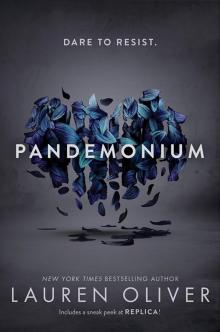 Pandemonium
Pandemonium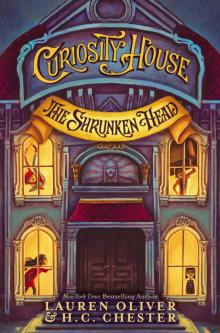 The Shrunken Head
The Shrunken Head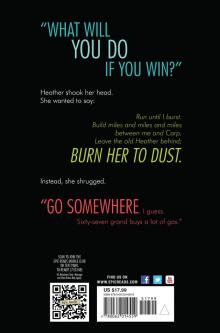 Panic
Panic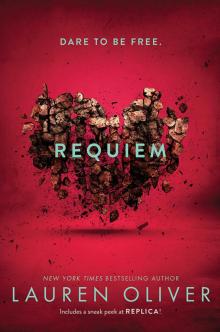 Requiem
Requiem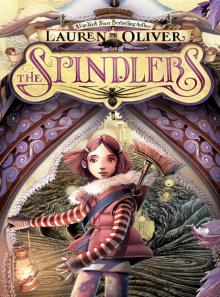 The Spindlers
The Spindlers Annabel
Annabel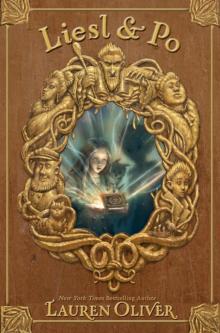 Liesl & Po
Liesl & Po Raven
Raven Alex
Alex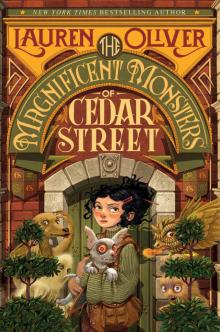 The Magnificent Monsters of Cedar Street
The Magnificent Monsters of Cedar Street Vanishing Girls
Vanishing Girls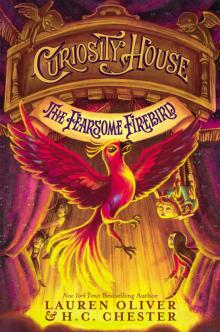 The Fearsome Firebird
The Fearsome Firebird Raven: A Delirium Short Story
Raven: A Delirium Short Story Annabel: A Delirium Short Story
Annabel: A Delirium Short Story Hana: A Delirium Short Story
Hana: A Delirium Short Story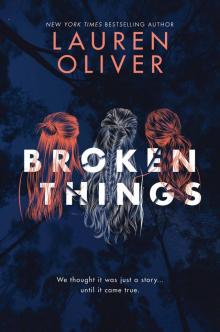 Broken Things
Broken Things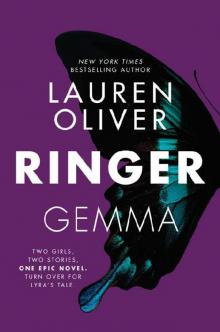 Ringer (Replica)
Ringer (Replica) Alex (delirium)
Alex (delirium)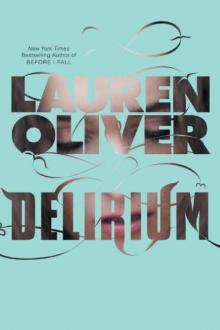 Delirium dt-1
Delirium dt-1